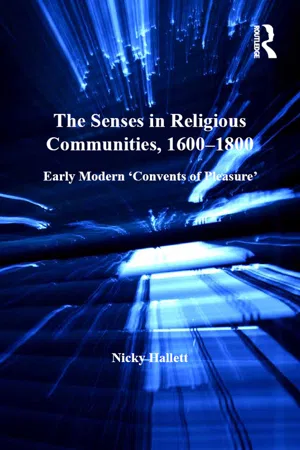
eBook - ePub
The Senses in Religious Communities, 1600-1800
Early Modern ‘Convents of Pleasure’
- 262 pages
- English
- ePUB (mobile friendly)
- Available on iOS & Android
eBook - ePub
About this book
Offering a comprehensive analysis of newly-uncovered manuscripts from two English convents near Antwerp, this study gives unprecedented insight into the role of the senses in enclosed religious communities during the period 1600-1800. It draws on a range of previously unpublished writings-chronicles, confessions, letters, poetry, personal testimony of various kinds-to explore and challenge assumptions about sensory origins. Author Nicky Hallett undertakes an interdisciplinary investigation of a range of documents compiled by English nuns in exile in northern Europe. She analyzes vivid accounts they left of the spaces they inhabited and of their sensory architecture: the smells of corridors, of diseased and dying bodies, the sights and sounds of civic and community life, its textures and tastes; their understanding of it in the light of devotional discipline. This is material culture in the raw, providing access to a well-defined locale and the conditions that shaped sensory experience and understanding. Hallett examines the relationships between somatic and religious enclosure, and the role of the senses in devotional discipline and practice, considering the ways in which the women adapted to the austerities of convent life after childhoods in domestic households. She considers the enduring effects of habitus, in Bourdieu's terms the residue of socialised subjectivity which was (or was not) transferred to a contemplative career. To this discussion, she injects literary and cultural comparisons, considering inter alia how writers of fiction, and of domestic and devotional conduct books, represent the senses, and how the nuns' own reading shaped their personal knowledge. The Senses in Religious Communities, 1600-1800 opens fresh comparative perspectives on the Catholic domestic household as well as the convent, and on relationships between English and European philosophy, rhetorical, medical and devotional discourse.
Frequently asked questions
Yes, you can cancel anytime from the Subscription tab in your account settings on the Perlego website. Your subscription will stay active until the end of your current billing period. Learn how to cancel your subscription.
No, books cannot be downloaded as external files, such as PDFs, for use outside of Perlego. However, you can download books within the Perlego app for offline reading on mobile or tablet. Learn more here.
Perlego offers two plans: Essential and Complete
- Essential is ideal for learners and professionals who enjoy exploring a wide range of subjects. Access the Essential Library with 800,000+ trusted titles and best-sellers across business, personal growth, and the humanities. Includes unlimited reading time and Standard Read Aloud voice.
- Complete: Perfect for advanced learners and researchers needing full, unrestricted access. Unlock 1.4M+ books across hundreds of subjects, including academic and specialized titles. The Complete Plan also includes advanced features like Premium Read Aloud and Research Assistant.
We are an online textbook subscription service, where you can get access to an entire online library for less than the price of a single book per month. With over 1 million books across 1000+ topics, we’ve got you covered! Learn more here.
Look out for the read-aloud symbol on your next book to see if you can listen to it. The read-aloud tool reads text aloud for you, highlighting the text as it is being read. You can pause it, speed it up and slow it down. Learn more here.
Yes! You can use the Perlego app on both iOS or Android devices to read anytime, anywhere — even offline. Perfect for commutes or when you’re on the go.
Please note we cannot support devices running on iOS 13 and Android 7 or earlier. Learn more about using the app.
Please note we cannot support devices running on iOS 13 and Android 7 or earlier. Learn more about using the app.
Yes, you can access The Senses in Religious Communities, 1600-1800 by Nicky Hallett in PDF and/or ePUB format, as well as other popular books in Literature & Literary Criticism. We have over one million books available in our catalogue for you to explore.
Information
Table of contents
- Cover Page
- Half Title Page
- Frontmatter 1
- Title Page
- Copyright Page
- Dedication
- Table of Contents
- Acknowledgements
- Introduction: Touching Nuns
- 1 In Which Mrs Eyre Protects the Impressionable Souls of her Tender Daughters
- 2 Becoming Behaviour: Two Cases of Sensational Reading
- 3 Titillation and Texture: The Sixth Sense of ‘Handsome Handid Nuns’
- 4 Of Taste and Tongue: ‘a very slippery member’
- 5 Still Small Voices: Sounds, Sibilance and Silence in Early Modern Convents
- 6 Of Smell and Space: ‘Evaporating Subjects’
- 7 Eagle-eyed Nuns: Envisioning Vision in Contemplative Communities
- 8 Sensate Certainty: A Conclusion of Sorts
- Bibliography
- Index